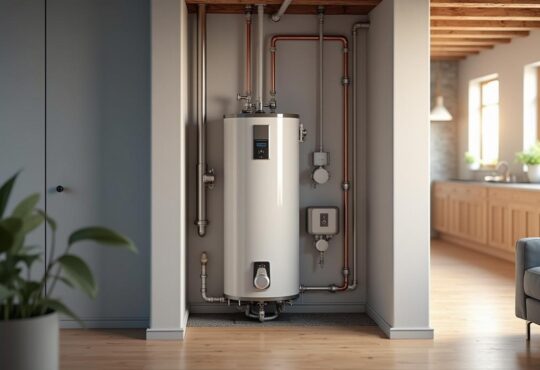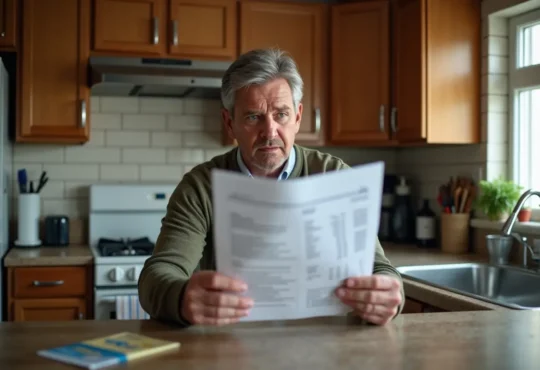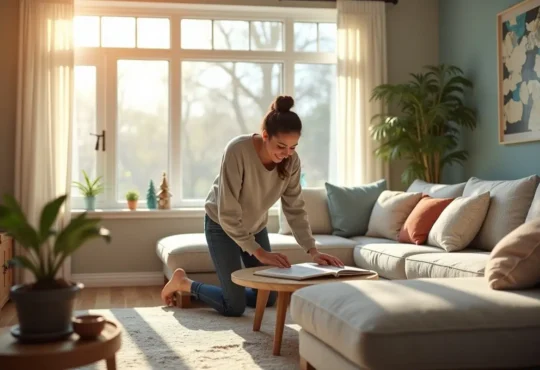
How to Clean Plumbing Pipes
Your home’s plumbing pipes tell a story about its health, especially when you have maintenance needs. The drains signal problems through slow drainage, odd gurgling noises, water backups and foul smells. Bathroom clogs happen most often because of long hair and toothpaste. Grease creates 47% of residential sewer blockages, making it a serious concern.
Your plumbing system needs regular cleaning to stay in top shape. You can choose from several methods to clean your pipes without damaging them. Professional plumbers stay away from chemicals and use mechanical tools like drain augers, hydro-jetters, and video inspection equipment. Hot water flushes are a great way to get economical maintenance solutions to keep your pipes clean. This piece covers DIY solutions and professional techniques that clean out plumbing pipes, and shows you the right ways to clean copper plumbing pipes.
Contents
Signs You Need to Clean Your Plumbing Pipes
Your plumbing system sends clear signals before small issues turn into big problems. You can spot these warning signs early to figure out if your plumbing pipes need cleaning.
Slow draining sinks or tubs
Sluggish drains are the most obvious signs that your pipes need attention. The problem usually starts small and gets worse each day. You might find yourself brushing teeth over a sink full of toothpaste foam or standing in ankle-deep water while showering. Hair caught in sink stoppers, soap scum, and beard trimmings create a sticky mess that causes bathroom drain problems. Kitchen drains get clogged because food particles and grease build up and block water flow. Houses with hard water face extra challenges since mineral deposits make pipe openings smaller.
Gurgling sounds from drains
The bubbling or glugging noises from your drains aren’t just annoying – they’re telling you something’s wrong. These sounds happen when air pockets bubble up through water. The gurgling usually means you have partial clogs that haven’t completely blocked the pipes yet. On top of that, it could mean blocked drain vents can’t let sewer gasses escape through roof pipes, which pushes air bubbles back through the water. The situation gets more serious if the gurgling points to main sewer line damage, where sewage starts backing up into your house. You might also hear these weird sounds from damaged or poorly installed plumbing.
Unpleasant odors from pipes
Bad smells from your drains mean it’s time to clean those pipes. Your drain’s dark, wet environment is perfect for bacteria that feed on waste. Organic matter piles up inside pipes and starts to rot, which releases nasty-smelling gasses. A working P-trap (that curved pipe under your sink) should stop sewer gasses from getting into your home by keeping a water seal. So if you smell sewage or rotten eggs, your P-trap might be dry, broken, or really dirty.
Presence of fruit flies
Those tiny fruit flies buzzing around your drains are both annoying and a red flag. These bugs love dark, wet spots filled with food bits, which makes your kitchen drain their perfect home. The flies thrive especially in drains that have clogs or plumbing problems where water sits still. If you see them in bathrooms, it often means you’ve got leaky pipes or clogged drains. The insects eat and breed in the gunk left in dirty pipes, and female flies can lay up to 300 eggs that keep the breeding cycle going.
Safe and Natural Ways to Clean Plumbing Pipes
Natural cleaning methods are great alternatives to harsh chemicals that can clean your plumbing pipes. These methods keep your pipes and the environment safe while maintaining strong cleaning power.
Boiling water flush
A simple way to clean plumbing pipes is to use boiling water. This works best if you have minor grease clogs in your kitchen sink. You should boil two liters of water and pour it down the drain in stages. Let each pour do its work before adding more. Be careful with this method. Don’t use boiling water if you have PVC pipes because high temperatures can warp or melt them. The hot water might crack porcelain or damage wax seals in toilets.
Baking soda and vinegar method
Baking soda and vinegar create a powerful natural cleaning reaction. Start by pouring 1/2 cup of baking soda down the drain. Add 1/2 cup of vinegar right after. Carbon dioxide bubbles will form and create a fizzing action that loosens debris. Let everything sit for 15-60 minutes and flush with hot (not boiling) water. This method works because baking soda acts as a mild abrasive and its alkaline properties neutralize acids. The vinegar breaks down soap scum and mineral deposits.
Using salt and hot water
Salt is a natural way to clean your plumbing pipes. Its rough texture scrubs away sticky residue and grease buildup. Mix 1/2 cup of salt with hot water and pour it down the drain to fix minor clogs. Salt works well on organic material and grease, but it might not help with solid debris like hair. Use this method carefully because too much salt can corrode metal pipes over time.
How to clean copper plumbing pipes safely
Copper pipes need gentle cleaning to avoid damage. Don’t use abrasive tools or cleaners on green corrosion (patina) as they might scratch the surface. Make a cleaning paste by mixing equal parts salt, vinegar, and flour. Put on gloves and apply this paste to affected areas. Wait 30 minutes before wiping it clean with a damp cloth. Ketchup can also work on corroded areas – let it sit for 20 minutes before rinsing. After cleaning, add a thin layer of olive or linseed oil to protect your copper pipes from future oxidation.
Mechanical Tools for Cleaning Out Plumbing Pipes
Mechanical tools pack more cleaning power than natural remedies to clear stubborn pipe blockages. Professional-grade equipment can remove the toughest clogs from your plumbing system.
Using a plunger effectively
A simple plunger stands as your first line of defense against clogs. Water should cover the plunger cup to create a proper seal. Start with gentle pushes to push air out of the cup. Then apply firm pressure up and down. Keep this up for 15-20 seconds and check if the clog has cleared. Put a damp cloth over overflow drains in sinks to stop air from escaping. Pick the right plunger type – cup plungers work on flat surfaces, while flange plungers with extended rubber lips fit toilets better.
How to use a drain snake or auger
Drain snakes can reach clogs that plungers can’t touch. Push the cable into the drain until you feel resistance. Once you hit the blockage, pull out 6-12 inches of cable, lock the collar, and start rotating. Keep turning while feeding more cable slowly. Pull the snake back steadily after breaking up the clog. Take out the P-trap first to reach the drainpipe directly in sinks. Light-duty manual crank augers handle small clogs, while powered drum augers tackle serious blockages.
When to try a hydro-jetter
Hydro-jetting blasts through tough blockages with high-pressure water (7,000-60,000 PSI). This method cleans pipe walls completely and stops future buildup. Unlike snakes that just punch holes in clogs, hydro-jetting removes all debris from pipe walls. You’ll find portable units for homes, cart jetters for medium jobs, and truck-mounted systems that can handle tree roots. Experts recommend this treatment every 18-22 months to prevent problems.
Video inspection for deep clogs
Video inspection tools take the guesswork out of pipe problems. A waterproof camera on a flexible cable shows live footage as it moves through pipes. This technology spots blockages, damage, and root intrusions without digging up pipes. Smart plumbers run video inspections before aggressive cleaning methods like hydro-jetting to check pipe conditions. These inspections help decide between trenchless repairs or full pipe replacement.
How to Keep Plumbing Pipes Clean Long-Term
Fixing plumbing problems after they happen wastes time and money. Your pipes will stay in great shape for years with proper maintenance.
Install drain screens
Drain screens protect your plumbing system by catching hair, food particles, and debris before they reach your pipes. These affordable mesh guards substantially lower the risk of clogs and make your pipes last longer. Clean these screens after each use to keep water flowing freely. Homes that have drain screens in all sinks and showers need far fewer emergency plumber visits.
Avoid pouring grease or food scraps
Grease causes 47% of residential sewer blockages. Hot cooking oils might flow easily, but they turn solid inside pipes and trap food particles that create tough clogs. The best practice is to pour used grease into sealed containers for trash disposal. You should scrape plates into garbage bins before rinsing them to keep food particles out of drains.
Flush with hot water weekly
Hot water running through pipes each week melts small grease buildups and soap residue before they turn into clogs. Boiling water works great for metal pipes, while warm water suits PVC pipes better to avoid warping. This easy habit keeps water flowing smoothly and reduces bacteria that cause bad smells.
Use enzymatic cleaners monthly
Enzyme-based cleaners contain good bacteria that break down organic waste naturally. These biodegradable formulas clean pipes without damaging them and stop buildup from forming. Using them monthly helps keep drains clear and eliminates bad odors. These products work best when used to prevent clogs rather than fix existing ones.
Limit garbage disposal use
Your garbage disposal should handle small food bits, not work as a trash can. Keep fibrous vegetables, coffee grounds, pasta, rice, bones, and grease away from disposals. Cold water should run during and after use to help solidify fats for better grinding. Proper care will help your disposal last beyond its usual 10-year lifespan.
Schedule annual professional maintenance
Plumbers perform complete inspections that spot potential problems before they become costly emergencies. Annual checkups usually include leak detection, pipe flushing, and drain line inspection. This smart approach prevents expensive repairs, keeps water pressure ideal, and makes your system last longer.
Summary
Homeowners can save time, stress, and money by maintaining their pipes regularly instead of waiting for emergency repairs. Minor clogs might seem like small annoyances at first, but they often point to bigger issues that need attention. Your plumbing system works best when you prevent problems rather than react to them.
Natural cleaners like baking soda and vinegar are a great first step to clear minor blockages. But tough clogs might need mechanical solutions such as plungers, drain snakes, or professional hydro-jetting services. The right cleaning method depends on how bad the clog is and what your pipes are made of.
A consistent maintenance routine makes all the difference. Installing drain screens, disposing of grease properly, running hot water weekly, and using enzymatic cleaners monthly will substantially extend your pipes’ life. These simple habits stop major problems before they start.
Your plumbing system needs a yearly checkup from a professional to spot hidden issues you might miss. Licensed plumbers have special equipment and know-how to get a full picture of your plumbing system. This helps you avoid surprise breakdowns and emergency service calls that can get pricey.
Clean pipes work better, smell better, and last longer. Now that you know about cleaning methods and preventive maintenance, you can keep your plumbing system healthy. Note that small, regular efforts to care for your pipes today will prevent big problems tomorrow.





 Hi I'm Joe.
Hi I'm Joe. 